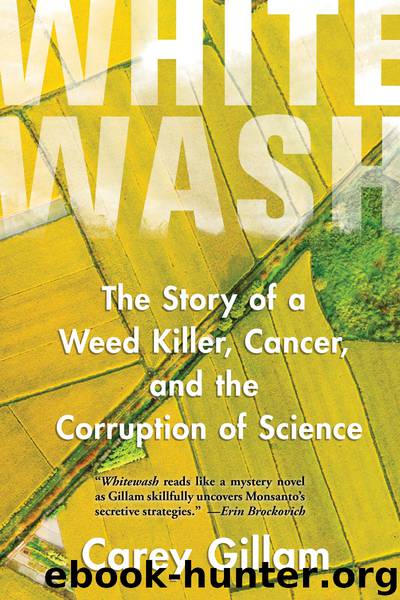Whitewash by Carey Gillam

Author:Carey Gillam
Language: eng
Format: epub
Publisher: Island Press
Published: 2017-10-18T04:00:00+00:00
The diplomatic interest in the glyphosate debates in Argentina, Colombia, and Ecuador are only a few examples of a much broader program under which U.S. taxpayers have been footing the bill for overseas lobbying of the products developed by Monsanto and other seed and agro-chemical makers. There are hundreds of diplomatic cables between the U.S. State Department and embassies in more than one hundred countries that show State Department officials as active promoters of the types of GMO soy, corn, and cotton that took over Argentine agriculture. Expanded use of those glyphosate-tolerant crops meant more use of glyphosate and higher sales for companies producing the chemical. The cables show that U.S. officials often worked to quash any public criticism of the technology, the chemicals, and the companies, such as Monsanto, selling the products. The cables also show that U.S. diplomats supported Monsanto’s work abroad even after the company was charged with bribing an Indonesian official and violating the Foreign Corrupt Practices Act in 2005. Monsanto ultimately paid a $1.5 million fine in that case.25
One 2009 cable showed that the U.S. Embassy in Spain sought “highlevel U.S. government intervention” at the “urgent requests” of Monsanto to combat biotech crop opponents there. The cables also reveal that State Department officials instructed embassies to “troubleshoot problematic legislation” related to biotech crops, and to “encourag[e] the development and commercialization of ag-biotech products.” The State Department also produced pamphlets promoting GMOs in Slovenia, sent pro-GMO industry DVDs to high schools in Hong Kong, and helped bring foreign officials and media from seventeen countries to the United States to promote biotech agriculture.26
The details contained in the cables deepened suspicions that the U.S. government does more to promote global acceptance of biotech crops than to protect the public from harm. “I believe that our government is more interested in pushing ag biotech interests than looking objectively at independent science data that shows the potential harmful effects,” said Pamm Larry, a U.S. activist who has called for more scrutiny of GMOs and glyphosate. “Why is it that our tax dollars are being used to force countries and their citizens to use and consume products they don’t want from an industry that’s poisoning the planet?”27
Another South American country caught up in controversy over glyphosate is Paraguay, which borders Argentina to the north. As in Argentina, Paraguay’s landscape has been transformed as it became a leading supplier of GMO glyphosate-tolerant soy. Aerial spraying of farm fields with glyphosate and other chemicals has forced many people from their villages and raised health concerns like those seen in Argentina. People living near the farm fields have complained that their rivers have become contaminated with the pesticides used on the soybeans, and they have reported rising rates of birth defects in their children. Farmers have found it hard to grow anything but the glyphosate-tolerant soy because other crops die if they come into contact with the herbicide, which drifts from field to field.28
For Judy Hatcher, who served as coleader of the international Pesticide
Download
This site does not store any files on its server. We only index and link to content provided by other sites. Please contact the content providers to delete copyright contents if any and email us, we'll remove relevant links or contents immediately.
Quantitative and Pattern Recognition Analyses of Five Marker Compounds in Raphani Semen using High-Performance Liquid Chromatography by Unknown(4142)
Alchemy and Alchemists by C. J. S. Thompson(3520)
The Elements by Theodore Gray(3057)
The Club by A.L. Brooks(2925)
How to Make Your Own Soap by Sally Hornsey(2901)
Drugs Unlimited by Mike Power(2594)
Wheels of Life by Anodea Judith(2152)
Cracking the LSAT, 2012 Edition by Princeton Review(1955)
Cracking the Sat French Subject Test, 2013-2014 Edition by The Princeton Review(1880)
The Flavor Matrix by James Briscione(1833)
Perfume by Jean-Claude Ellena(1820)
The Cosmic Machine: The Science That Runs Our Universe and the Story Behind It by Scott Bembenek(1761)
The Thing Around Your Neck by Chimamanda Ngozi Adichie(1701)
MCAT Physics and Math Review by Princeton Review(1690)
1000 Multiple-Choice Questions in Organic Chemistry by Organic Chemistry Academy(1662)
Cracking the SAT Premium Edition with 6 Practice Tests, 2017 by Princeton Review(1590)
Handbook of Modern Sensors by Jacob Fraden(1583)
Synchrotron Light Sources and Free-Electron Lasers by Eberhard J. Jaeschke Shaukat Khan Jochen R. Schneider & Jerome B. Hastings(1559)
A is for Arsenic: The Poisons of Agatha Christie (Bloomsbury Sigma) by Kathryn Harkup(1548)
